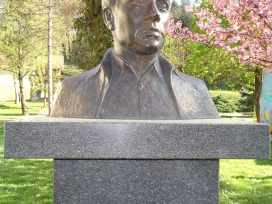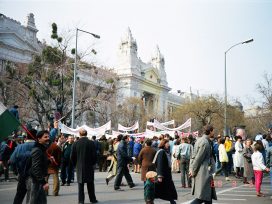A year has passed since the last parliamentary elections in Slovenia. And so it is time for an inventory and first impressions of what this “triple left” government, as it is called, headed by Borut Pahor, has accomplished, to look at what expectations have been met and what haven’t. To be more precise, we are interested in only one issue in these and similar assessments that are offered in all kinds of places on these occasions.
Articles
Read more than 6000 articles in 35 languages from over 90 cultural journals and associates.
Spinoza’s rationalist philosophy was central to the “radical” Enlightenment of late seventeenth century Europe and a century later had a decisive impact on the development of German Idealism. At the beginning of the twentieth century, his critique of revealed religion was the focus of heated discussions among Jewish thinkers; and in the 1960s Marxist philosophers, including Althusser, saw Spinoza’s understanding of the imagination as a forerunner to the concept of ideology. This strand of his thought was taken a step further by Hardt and Negri in their highly influential work Empire, while most recently António Damásio has argued that there are significant affinities between Spinoza’s psychology and contemporary discoveries in neurophysiology.In the following interview, leading Spinoza experts discuss the seventeenth-century philosopher’s relevance today.

Meeting halfway
Recent Macedonian literature between tradition and innovation
Female Macedonian novelists are reversing the male dominance of the genre, writes Lidija Kapushevska-Drakulevska. In poetry, meanwhile, “a completely individualized form of expression” has developed, and it is here that the biggest innovations are being made.
Today, the neurosciences enjoy a similar prestige as psychoanalysis in the twentieth century, write Hennric Jokeit and Ewa Hess. Despite the immense costs for healthcare systems, the fear of depression, dementia and attention deficit disorder legitimises the boom in neuro-psychotropic drugs. In a performance-driven society that confronts the self with its own shortcomings, neuroscience serves an expanding market.
In praise of hybridity
Globalization and the modern western paradigm
The division of the world into “the West and the rest” is a misrepresentation, writes Ales Debeljak. Cultural globalization is not the transplantation of western ideas and technologies across the planet, but the adaptation of these according to local requirements. Hybridity, the product of a longue durée, is at the heart of the contemporary western paradigm.
“It had not occurred to me that I was violating rigid custom in appearing in a hat and gauze veil rather than a ‘chadar’ and face cloth, but the mistake was made unpleasantly apparent.” Isabella L. Bird and Louisa Jebb both travelled to the Middle East at the turn of the twentieth century. Hannah Adcock compares their journals.
Some sophisticated arguments for God have been made in response to the New Atheists. Richard Norman puts the “New Believers” to the test.
From spring to autumn
The Estonian media post-independence
The Estonian media today has disappointed hopes that it would be a model of its kind in the post-Soviet space, writes Tiit Hennoste. While the traditional notion of journalists as “teachers of the people” survived the Soviet era, the pressures of independence proved insuperable. Estonia’s size means personal sympathies override political views, while a tiny market makes advertising sales paramount.

The shot putter is the origin of movement while the surfer enters a movement that already exists. For Deleuze, therein lies the difference between traditional and new sports. Karl Palmås rides this wave of thought towards a philosophy of surfing.
There is near universal consensus that a multilateral treaty is the only way to reduce global carbon emissions. Yet experience shows that deals focused on top-down mechanics fail, writes Simon Zadek. Unilateral action based on national self-interest is the only hope we have of effectively managing climate change.

A reluctant and fearful West
1989 and its international context
How far did the West support the transformation of eastern Europe in 1989? Documents recently released from the Hungarian archives reveal how western leaders, without exception, deferred to the Soviet Union at the time, writes László Borhi. The threat of regional chaos and residual fear of German hegemony meant an overwhelming support for preserving the status quo as the events of 1989 unfolded.
As the US economy continues to worsen and unemployment rises, everyone including the President is holding their breath. Everyone except the veteran economist Paul Volcker, that is. George Blecher says he might be on to something.
Ecological materialism
How nature becomes political
The fundamentalist justification for ecological politics is outdated, writes Jürgen Trittin, chairman of the German Green party. The ecological reform of the global economy must bring on board those with no interest in preserving nature per se. The more radical, “nature-oriented” and naive a demand is, the less likely it is to be realized and the more catastrophic the consequences will be.
Global warming, if left unchecked, will undermine development, overtax social capacities and endanger international stability. Progressive policy must focus on “managing the unavoidable” and “avoiding the unmanageable”.
Ecofeminism
Towards a fruitful dialogue between feminism and ecology
Combining feminist and ecological approaches, ecofeminism opposes the domination of the white male over women, over the poor and over the natural world. Virginie Maris surveys epistemological, moral and social forms of the ecofeminist critique, drawing conclusions about the association between reductionist science and paternalist capitalism.